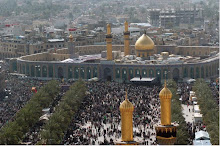Our Future Residence: An In Depth Look at Barzakh [Purgatory]
In his will to Imam Hasan (AS), Imam Ali (AS) said, "My son, know that you have been created for the next world and not for this world, and for annihilation and not for stay, for death and not for life; you are in a transient place, a place which is a path to the Hereafter... You are driving away a death from which no one can run away and which none of its seekers can miss. It has to be experienced, so beware lest it catches up with you while you are in a bad state." (Nahjul Balagha [Peak of Eloquence], Letter 31)
As the Holy Infallibles constantly reminded us, our departure from this world is imminent. It is but a transitory place, a mere passage to our permanent abode, while the Hereafter is for eternity - beginning with life in the grave, followed by the stage of Barzakh [Purgatory], continuing on until the Day of Judgment until we can finally enter Paradise and/or Hellfire. Each of these phases of life has different effects, occurrences, and outcomes, all depending on our deeds and beliefs in this short and temporal world. Yet for most of us, the next world is too frightful to even think about, and such fear is often coupled with a general lack of awareness of what exactly we will encounter once the soul disconnects with the material body and enters a whole other dimension of life. Just as we care to make sure we know exactly where we are going for any journey we embark upon, let us gain insight into the most important of journeys that awaits us after we die.
Shaikh Abbas al-Qummi has stated in his book Manazelul Akhera that one of the principal factors of Shia Islam [Muslims], belief in which is obligatory, is the questioning in the grave by the angels Munkar and Nakeer. The questions will pertain to one's beliefs (Aqaid) and deeds (Amaal), and will be put to every believer as well as non-believer; only infants, the mentally disabled, and those of lesser intellect are exempt from it. The two angels with voices like thunder and eyes like lightening will ask: (1) Who is your Lord? (2) Who is your Prophet? (3) What is your Religion? (4) Who is your Imam?
The person is also questioned about his prayers, his fasts, Hajj, Zakat, Khums and his love for the Ahlul Bayt (Peace be upon them all). Imam Zainul Abedeen (Peace be upon him) says that after the questioning about the beliefs of Islam, the person is questioned about how he spent his life, and also about the way he earned and spent his wealth. If the deceased is able to give correct answers, a gate is opened near his head, and his grave is widened as far as he can see. The period of Barzakh (which will continue until the Day of Resurrection) passes with ease and the angels proclaim to him, "Sleep thou like a newly wedded bride" (Al-Kafi). However, if the deceased is unable to give correct replies, a door of hell of Barzakh will open for him, and a breath from the breaths of hell will fill his entire grave.
The questioning in the grave will therefore be a cause of happiness for the believer, proclaiming an era of eternal happiness. He will confidently give testimony to the Oneness of the One God and the Messengership of His Beloved Messenger, see the beautiful faces of the angels, and smell the fragrance of the gardens of Paradise accompanying them. That is why such angels have been named "Mubashir and Basheer" (announcers of good tidings). On the contrary, unbelievers in their grave will see the beginning of their pains and divine punishment, opening their eyes to the misfortune and torture that lies ahead of them. The very arrival of the angels will terrorize such deniers, and this is why these angels are named "Munkar and Nakeer" (the abhorring ones).
Allama Majlisi in his Mahasin quotes Imam Baqir and Imam Saqid [A.S.] that when a believer dies, six figures enter his grave along with him. Out of these, one is more illuminated, pure, and fragrant than the others. One stands on the right side, the second on the left, the third in front, the fourth near the head, the fifth near the legs, and the one more illuminated shelters on the head. From whichever side the wrath of Allah comes, the figure on that side defends the body. The one who is more illuminated asks these other figures: "May Allah bless you all, who are you?" The one on the right side says, "I am the prayers (Salat) which he recited in his lifetime." The one on the left side says, "I am the charity which he gave while alive." The one standing in the front says, "I am his fasts he undertook." The one near the head says, "I am the Hajj and Umrah which he performed in his life." The one standing near the legs says, "I am the kindness which he performed with his brother believer." Then all of these faces turn towards the more illuminated one and ask it as to who it is. He replies, "I am the love for the Ahlul Bayt which he carried in his heart" (Manazelul Akhera).
Adopted from Al-Ilm, An Idara-e-Jaferia Publication, 2010
Subscribe to:
Comments (Atom)




